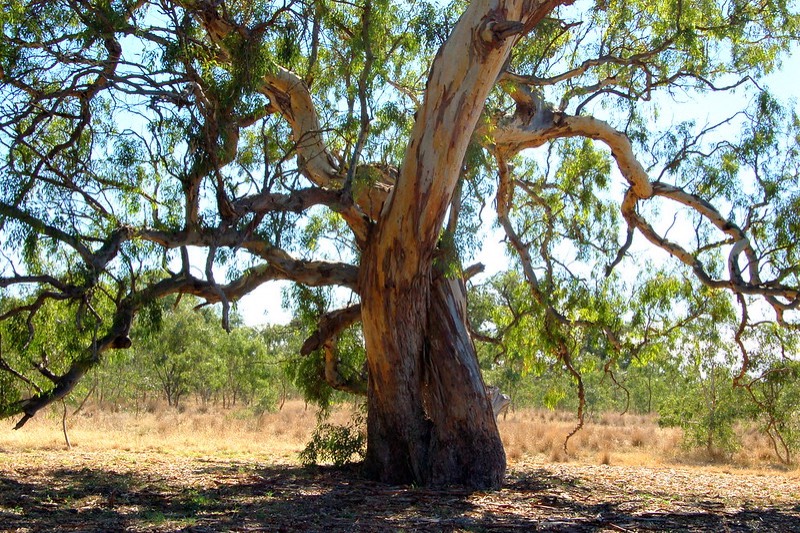‘Don’t be afraid, don’t be scared, it won’t hurt you. It’s coal’.
Scott Morrison brandishing a lump of coal: question time, 9 Feb 2017
With windows open to the warm spring sunshine, I cruise slowly over the bumps, potholes, corrugations, washaways and erosions that some frustrated poet in the District Council had named Native Pine Road. Erica, broome, xanthoria, stringybarks, deprived looking banksia and almost every other conceivable version of roadside scrub except native pine crowd both sides of the 'road'. Two wheel tracks flank a hard, central ridge which, building up over the years, has now attained just the height that will most effectively rip the sump out of the average, injudiciously handled family car. No trouble, however, for my battered one-ton truck which, though it gives a rigid, bone-shuddering ride even on the best roads, takes a lot of stopping.

The advertisement in the local paper that had moved me to explore Native Pine Road was curt, almost as if it would rather not have been there at all: ‘Strainer posts. Red gum, blue gum, mountain gum’. And a phone number. I needed a couple of hefty posts for a planned gateway, so I gave it a shot. My first call is answered by a softly spoken woman who sounds elderly and disenchanted: no she doesn’t know how big the posts are or what they cost or if there are some left and in any case they’re ‘up at the other place’. My second attempt connects me with the world of the ‘woodman’ — Bob Johnson.
‘Well,’ he says in amiable tobacco-rich tones, ‘down in the scrub here there’s y’blue gum, y’white gum, y’red gum and y’mountain gum’. He then adds an ironic, expletive-laden summation of each type of wood in which the white gum is seen to be the least impressive because it ‘only lasts about thirty years’. With a brief anecdote, he dramatises for me, his audience at the other end of the phone, someone whose three hundred white gum posts have begun to rot in their thirtieth year: ‘I’m goin’ straight back to the bugger that sold me these and get replacements. Nothin’ worse than a fence that only lasts thirty [adjective] years, eh!’ In the end I chose red gum and so began my decades of intermittent association with this splendid wood.
All that was many years ago. I haven’t been back to Native Pine Road which, I hear has had a name change more acceptable to estate agents’ sensibilities and is now sealed, cambered and leads round gentle curves up to and through wrought iron gates to an expansive housing estate.
Soon after my encounter with Bob, I came across an article which included these remarkable sentences: ‘The red gum is the smooth-barked large tree that gives watercourses all over Australia their Australian feel… The red gum is without doubt, to any objective judge, the most beautiful tree in the world’. The writer was Professor Brian Medlin, from Flinders University. Medlin was a brilliant teacher so it was not surprising when, accepting his invitation to write songs depicting or inspired by modern Australian life, some of his students, among whom was an undergraduate named John Schumann, came up with a group known as Redgum. The rest is history of course and personal history as well, because I was a great fan of and later occasional writer for Redgum.
So this ‘smooth-barked large tree that gives watercourses all over Australia their Australian feel’ seemed intent on bobbing up in my life one way or another, sometimes as a result of sheer luck or coincidence. Which brings me to the most recent events on my red gum trail. In the park-like back paddock we share with various locals, there are a number of ancient red gums — solid, gnarled hosts to territorial, ever vigilant magpies, ebullient kookaburras, diligent nervy rosellas and, from time to time, waves of whingeing corellas.
'In general our political and business leaders show little interest in "the Australian feel" of things or in ancient stone or forests of immemorial age or in strings of stately red gums reflected in silent waters.'
We make regular winter forays into this paddock in the ute. My wife collects masses of bark (excellent kindling!) and I pick up windfalls which I reduce to manageable lengths with the chainsaw. This comfortable arrangement was recently ended, however, by an email to his siblings from my eldest son, who lives and works in England: ‘Don’t let the old man use the chainsaw from now on. Too dangerous at his age,’ he instructed.
This was very thoughtful and admittedly sensible but, with the woodshed looking pretty spare, we’d have to find a new supply. The answer to this dilemma soon came — in the form of a ton of red gum ordered, paid for and delivered as a result of arrangements devised in Manchester and supervised through the whole local process by my daughter from her outpost in the Adelaide Hills.
Will some grandstanding, philistine politician ever brandish a piece of red gum in federal Parliament, shouting. ‘Don’t be afraid… it won’t hurt you. It’s red gum’. Probably not. In general our political and business leaders show little interest in ‘the Australian feel’ of things or in ancient stone or forests of immemorial age or in strings of stately red gums reflected in silent waters: the true quiet Australians.
Brian Matthews was honorary professor of English at Flinders University and an award winning columnist and biographer.
Main image: River red gum at Mt Ridley reserve in Craigieburn (Elizabeth Donoghue/Flickr)